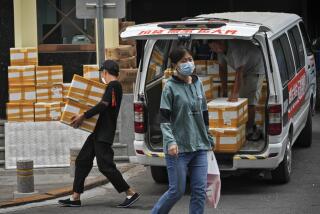China tightens control over financial inflows
- Share via
BEIJING — Beijing is tightening financial controls on trade to curb multibillion-dollar flows of speculative “hot money” into China that regulators say could fuel inflation, the government announced Thursday.
Beijing is trying to stop financial inflows that evade China’s strict controls and are believed to be adding to pressure for prices to rise at a time when the level of inflation is at a 12-year high. Speculators are believed to be trying to profit from a rise in China’s currency, the yuan, against the U.S. dollar.
Authorities will start checking invoices to make sure they are not being inflated as an excuse to bring extra money into China without approval, the State Administration of Foreign Exchange said on its website. It said the measures take effect July 14.
The move was unexpected and “warns speculators that the government will use any relevant policy measures -- rather than only exercising monetary policy tools -- to curb hot money and inflation,” said Sherman Chan, a Moody’s Economy.com analyst, in a report to clients.
Chan warned that the new system would slow trade and could hurt growth.
“The verification process may be lengthy unless the government devotes a large amount of resources to it,” she said. “The new checking system -- which will certainly slow foreign trade -- is expected to have a dampening impact on economic growth.”
China is one of the world’s biggest traders, with exports of $1.2 trillion and imports of $955.8 billion in 2007.
The yuan does not trade on world markets. Beijing allows money to enter the country for trade and investment but closely monitors such transactions.
Speculators who want to profit from the rising yuan are believed to be buying real estate and other Chinese assets that will then rise in dollar terms. The government does not release figures on how much unauthorized money is believed to enter China. But the official Xinhua News Agency, citing unidentified analysts, put the figure at $147.9 billion in the first five months of this year.
Government regulators are trying to cool inflation that pushed up consumer prices 7.7% in May compared with a year earlier.
More to Read
Sign up for Essential California
The most important California stories and recommendations in your inbox every morning.
You may occasionally receive promotional content from the Los Angeles Times.













